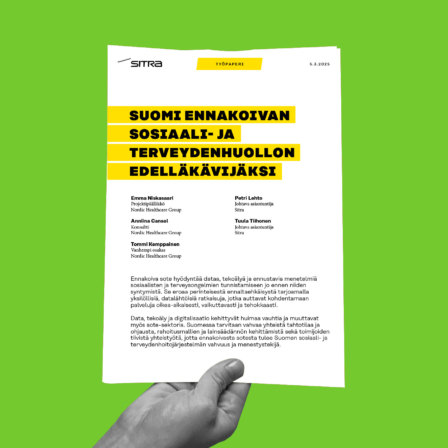Funding call: proactive healthcare and social welfare
In spring 2025, Sitra launched a funding call targeted at wellbeing services counties for projects aimed at boosting the uptake of proactive healthcare and social welfare solutions. We received a total of 15 applications, out of which four were selected for funding.
Content
Close table of contents
What is it about?
Innovative solutions are needed to make healthcare and social welfare more efficient and effective. Digitalisation, data and artificial intelligence are supporting innovation and paving the way towards proactive healthcare and social welfare services where latent risks to people’s health and well-being can be identified and addressed in time, even before symptoms appear.
We will accelerate the shift in the focus of social and healthcare from corrective to preventive action by opening up targeted funding for the wellbeing services counties.
Proactive methods such as data analysis can be used to make risk assessments and predictive models. In proactive healthcare and social welfare services, screening and treatment are guided by personal risk factors. Technology can be used to monitor a person’s care and identify gaps in care, thus enabling timely access to care and anticipation of service needs. Healthcare and social welfare services are provided proactively in the event of a client’s disability, and the most genetically appropriate medication is reviewed before prescribing.
For more information, see the detailed application instructions (in Finnish).
Funding granted to four projects
The projects are currently in progress and are set to conclude on 30 June 2026.
Wellbeing services county of Kanta-Häme
MieliReitti (Mental Health Route)
The goal of the project is to use AI-based text analysis to identify young people aged 13–23 who are at risk of needing mental health services. Intelligent text analysis aims to pinpoint factors affecting young people’s mental health. Data sources include the data lake of the wellbeing services county of Kanta-Häme, research on factors influencing young people’s mental health, and information related to their living environment. The focus is particularly on factors that can be addressed through early intervention.
As a result of the project, an AI model will be developed to enable the proactive identification of mental health challenges among young people. This will facilitate low-threshold service guidance and the provision of appropriate services for children and young people. The solution enables more efficient resource allocation to those with the greatest need for support and ensures timely access to low-threshold care.
Wellbeing services county of Pirkanmaa
Structured care planning for patients of primary care physicians using Kanta data
This project aims to create a service model that leverages Kanta data to assist primary care physicians in identifying high-risk patients and care gaps within their population. Proactively identifying high-risk patients allows the preparation of statutory health and care plans and targeted interventions for those who will benefit the most. This approach ensures continuity of care for patients, improves their treatment outcomes, and helps wellbeing services counties allocate resources effectively and with greater impact. The solution will be piloted at five social and healthcare centres.
The project employs the Health Benefit Assessment tool (available in Finnish, Terveyshyötyarvio ), which provides individual- and population-level health risk data and identifies care gaps. While the tool is already used in primary healthcare units across Finland, this project marks the first time its data foundation will be expanded to include Kanta data. This provides exceptionally comprehensive insights into individual health profiles.
Wellbeing services county of North Savo
AI-assisted tool for identifying medication risks
This project is focused on developing a tool based on research data and artificial intelligence to identify medication-related risks using data extracted from patient information systems. The tool is intended to detect and reduce medication discrepancies and adverse drug events, particularly among older people, as these pose significant patient safety risks and cost challenges for healthcare systems. The medication risk tool supports healthcare professionals in decision-making, enables more targeted and timely treatment, and enhances care processes, especially in primary care.
The objective is to develop a tool and medical device in a research-based manner that can be widely used to systematically identify medication risks. With Sitra’s funding, the project will deliver a prototype of the tool and an evaluation of its cost-effectiveness by the end of June 2026.
Wellbeing services county of Southwest Finland and the Centre for Safety and Quality in Healthcare (wellbeing services county of Ostrobothnia)
Proactive management of surgical complications
Patient injuries and adverse events often occur in surgical care, causing harm to patients and incurring additional costs. This project aims to develop an intelligent, single-entry-based reporting system integrated into information systems, where adverse events and near misses occurring in patient care can be reported.
The project will pilot the adoption of the internationally recognised Clavien-Dindo classification (C-D) within a wellbeing services county. At the same time, the use of artificial intelligence will be tested in identifying complication categories. The objective is to develop a nationally scalable structured documentation solution that reduces the documentation burden and facilitates the prediction of complications.
Latest
people
Junior Specialist, Innovations




